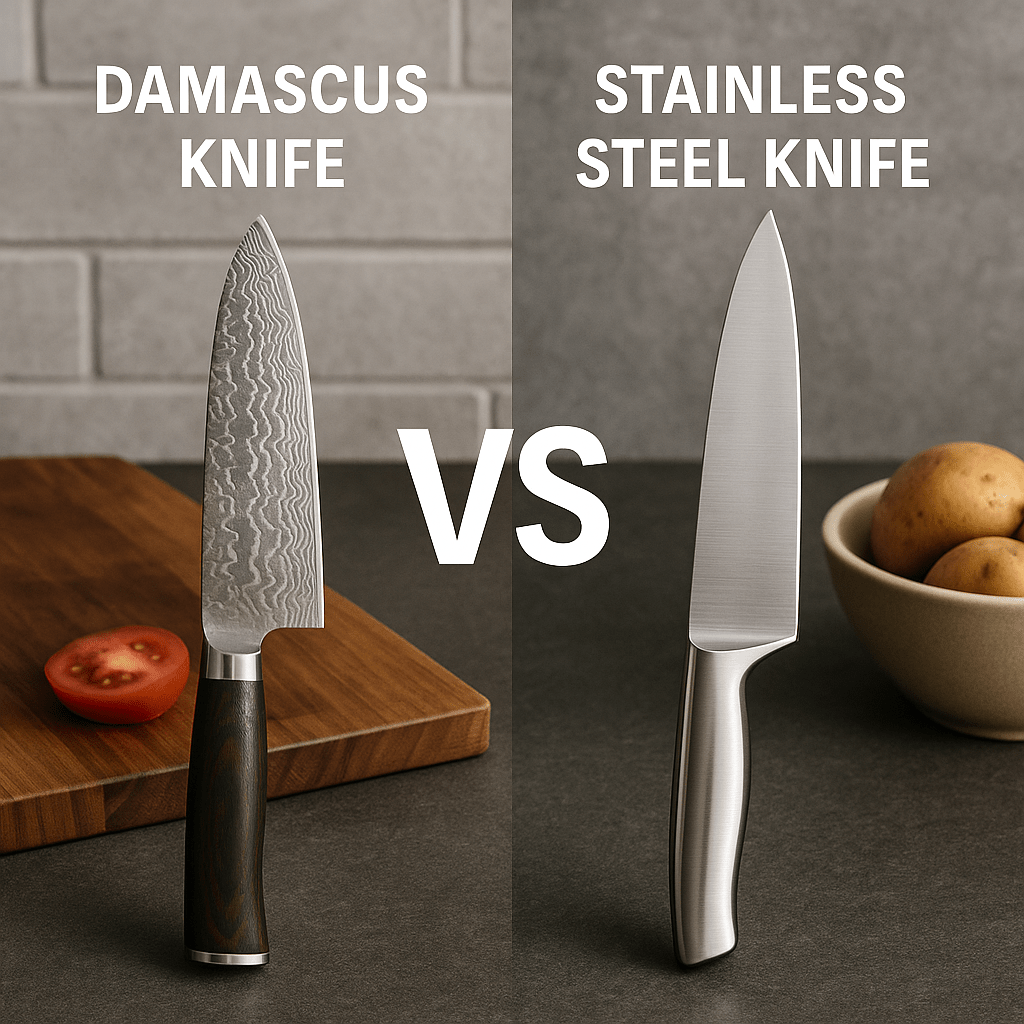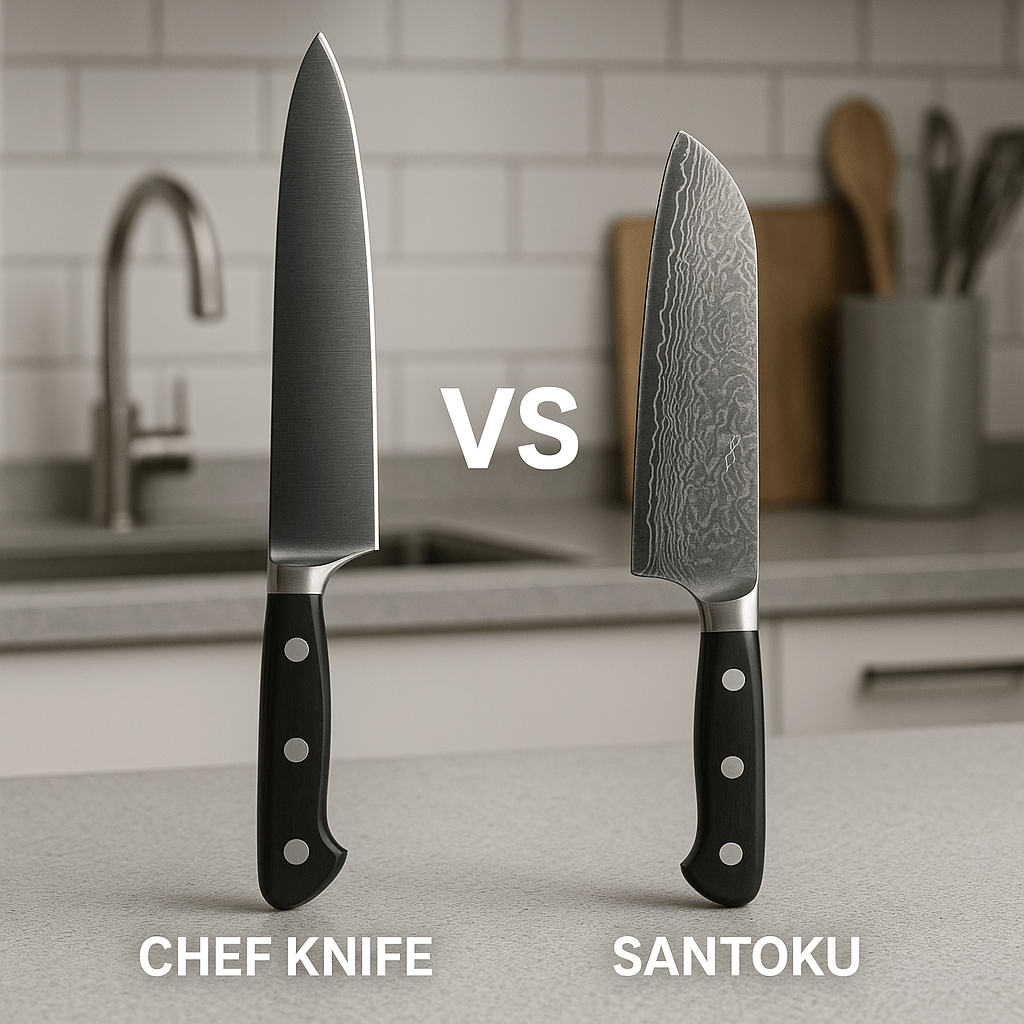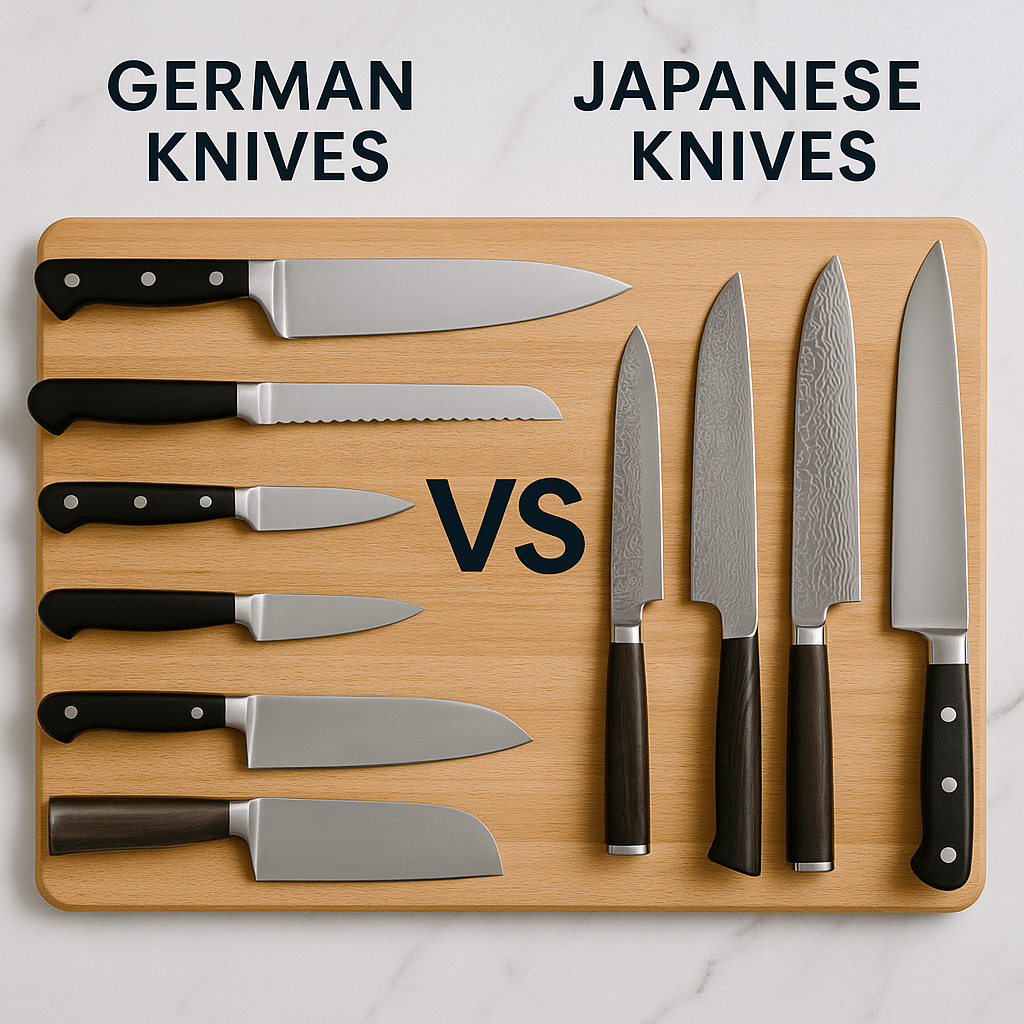
Damascus Steel Knife vs Stainless Steel Knife – Pros and Cons
When you compare a Damascus knife to a regular stainless steel knife, you’re not just comparing performance—you’re comparing centuries of craftsmanship, cultural tradition, and design philosophy. This guide breaks down how each performs in real kitchens, with a deeper focus on Damascus steel’s history, materials, and advantages.
What Is a Damascus Steel Knife?
Damascus steel refers to blades forged from multiple layers of steel, folded and hammered together to create distinctive wave-like or watery patterns. Originally developed in the Middle East and refined in Japan, the name “Damascus” today is associated with knives that combine cutting performance with visual artistry.
- Construction: Typically made with a hard steel core (such as VG-10) for sharpness, surrounded by multiple layers of softer stainless steels for durability and corrosion resistance.
- Appearance: Each blade is unique; the flowing patterns are not painted but created by the forging process itself.
- Symbolism: Damascus steel is seen as the perfect union of function and art—making it popular as a gift as well as a tool.
What Is a Stainless Steel Knife?
Stainless steel knives are mass-produced from single alloys with added chromium to resist rust and staining. They are widely available, affordable, and reliable, which makes them the backbone of most kitchens.
- Construction: Made from uniform steel, often softer than high-end Damascus cores.
- Strengths: Corrosion-resistant, dishwasher-safe (though not recommended), and lower maintenance.
- Best for: Everyday users who want durability without worrying about care routines.
Steel Composition & Craftsmanship
Damascus Steel
- Core Steel: Often VG-10, AUS-10, or other high-carbon stainless steels.
- Layers: 33 to 67 layers folded for strength and beauty.
- Hardness: HRC 60–62, meaning sharper edges that last longer.
- Craftsmanship: Forged with traditional Japanese methods; every knife has a unique blade pattern.
Stainless Steel
- Steel Type: 420, 440, or German steels like X50CrMoV15.
- Hardness: HRC 55–58, softer and less likely to chip.
- Craftsmanship: Often stamped from sheets of steel, allowing for mass production at lower cost.
Advantages of Damascus Knives
- Unmatched Sharpness: The hard steel core takes on a very fine edge, perfect for precision cuts.
- Long Edge Retention: Stays sharp longer than softer stainless knives.
- Unique Aesthetics: Each blade has one-of-a-kind patterns, turning a kitchen tool into a piece of art.
- Gift-Worthy: Damascus knives are popular for weddings, anniversaries, and holidays due to their beauty and cultural prestige.
- Light & Agile: Japanese-style Damascus knives are often thinner, making them feel nimble in hand.
Advantages of Stainless Steel Knives
- Rust Resistance: High chromium content prevents staining and corrosion.
- Durability: Softer steel resists chipping and can handle heavier tasks.
- Affordability: Lower cost makes them accessible to all kitchens.
- Low Maintenance: Easy to wash, forgiving even if left wet.
Performance in the Kitchen
| Feature | Damascus Knife | Stainless Steel Knife |
|---|---|---|
| Sharpness | Extremely sharp, fine edge | Good sharpness, less refined |
| Edge Retention | Excellent, holds edge longer | Good, but dulls faster |
| Durability | Hard edge, may chip if misused | Softer, forgiving under stress |
| Aesthetics | Unique patterns, luxury appeal | Simple, utilitarian look |
| Maintenance | Hand wash, dry immediately | Dishwasher safe (not ideal) |
| Price | Premium investment | Affordable to mid-range |
When to Choose Damascus Steel
Choose Damascus if you value beauty, performance, and heritage. Ideal for:
- Home chefs who love cooking as an art.
- Collectors who appreciate traditional craftsmanship.
- Gifting occasions—weddings, holidays, or professional milestones.
When to Choose Stainless Steel
Choose stainless steel if you prioritize durability and simplicity. Best for:
- Busy households needing tough, reliable knives.
- Cooks who want low maintenance tools.
- Budget-conscious buyers seeking practical value.
Care & Maintenance
- Damascus: Wash by hand, dry immediately, avoid dishwashers. Store properly to protect the edge and finish.
- Stainless: More forgiving, but still avoid dishwashers for best longevity.
- Both: Use wooden or quality plastic boards, hone regularly, sharpen when dull.
Weekly Deal 🔥
Experience the artistry and performance of Damascus steel with OSERM’s premium Japanese Damascus Steel Knives. Perfectly gift-ready, each knife is a blend of tradition and modern craftsmanship.
Shop OSERM Damascus Steel Knifes Now →
You Might Also Like
- Carbon Steel vs Stainless Steel Knives – Durability & Care
- The Truth About Damascus Knives – Worth It or Not?
- Best Knife Sets for Christmas Gifts
Tags: damascus knife vs stainless steel, damascus steel kitchen knives, japanese knives, OSERM






